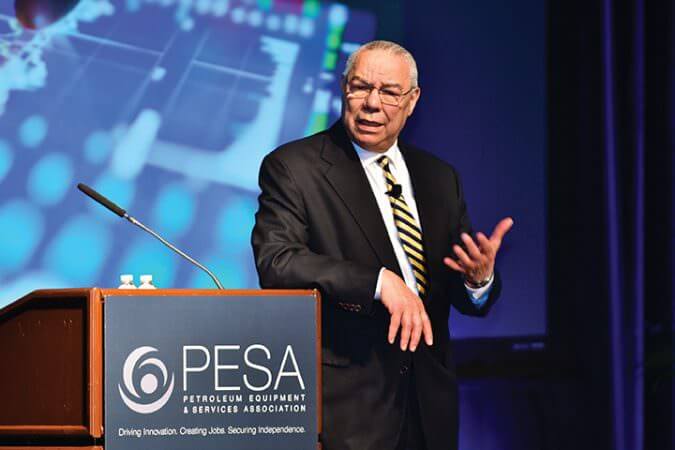
The Petroleum Equipment & Services Association (PESA) 2018 annual meeting focused on opportunities for the upstream industry in the current evolving global energy market, with thoughtful discussions ranging from oil price volatility to diversity and the energy sector’s future.
 Keynote speaker General Colin L. Powell, USA (Ret.) kicked off the meeting with a challenge to PESA members and our leadership role in the global economy.
Keynote speaker General Colin L. Powell, USA (Ret.) kicked off the meeting with a challenge to PESA members and our leadership role in the global economy.
“Trust and confidence go both ways in an organization,” he said. “If you create an environment where everyone will thrive, and treat them as equals, your people will have a sense of purpose. If you delegate authority to the people who work for you, amazing things will happen.”
Powell also gave an overview of current diplomatic challenges around the world, including particular focus on China and Russia.
PESA Chairman Dan Domeracki, Vice President, Government, Industry & Global Stewardship, Schlumberger, highlighted the strength of PESA Members’ combined voice in the industry.
“As PESA’s voice grows, and we use it responsibly, one of the things that we can do is to spend time working through these organizations and directly with the operators, our customers, to help align and coordinate the key issues that we’re going to champion,” Domeracki said.
PESA President Leslie Beyer also provided an update about the Association. “PESA has entered its third year of consecutive growth, thanks to the support of our Member Companies and their engagement with the Association,” she said.
An upstream panel offered perspectives from Jeff Shellebarger, President, Chevron North America Exploration and Production Company; Greg Hill, President and COO, Hess Corporation; and Brendan McCracken, Vice President and General Manager, Northern Operations, Encana. PESA Vice Chair Richard Alabaster, President – Surface Technology, TechnipFMC, moderated.
Michelle Lewis, Chief Strategy Officer, DistributionNOW, presented the results of a groundbreaking diversity study from PESA’s Engagement Committee that analyzes the current state of female talent in the oil and gas industry. As part of PESA’s commitment to bring a greater diversity of thought into our organization, companies and industry, the study takes a careful, analytical approach to establish diversity metrics specific to the oilfield service and supply sector.
The Analyst Panel, moderated by Board Member Kirk Shelton, President, NOV Completion & Production Solutions, engaged the speakers on an outlook of the industry, with both speakers forecasting multi-year growth in global drilling and completion (D&C) spending, with robust onshore spending and exploration and production (E&P) capital spending that will further demand for oilfield services.
PESA’s first-ever Environmental, Social and Governance (ESG) panel featured commentary from John Mingé, Chairman & President, BP America; Stephen Arbogast, Director, Kenan-Flagler Energy Center, University of North Carolina; and Greg Gershuny, Managing Director, Energy and Environment, Aspen Institute. PESA Chairman Dan Domeracki, Vice President, Government, Industry & Global Stewardship, Schlumberger, moderated.
Dr. Scott Tinker, Bureau of Economic Geology, University of Texas at Austin, spoke to the audience about the changing energy industry and how energy policy and technology can lift emerging communities out of poverty.
Tinker said there are arguments on both sides of the equation, with some thinking that climate change is the most important issue of the moment, and fossil fuels are the problem, with others thinking that poverty is the most important issue of the moment, and fossil fuels are the solution. The challenge is to seek the middle through civil discourse.
Jason Bordoff, Professor of Professional Practice in International and Public Affairs Founding Director, Center on Global Energy Policy Columbia University, gave the last keynote address at the meeting and reiterated what some other speakers had mentioned; the global energy sector is in transition.
“Easing oil and gas production rules may help on the margin, but production growth is already strong thanks to productivity and technology gains,” he said. PESA would like to thank all participants and sponsors of the event.
For more information regarding PESA, please visit www.pesa.org.
Photos courtesy of PESA














